A CONVERSATION WITH
Constance van Eeden, SSC 1990 Gold Medalist
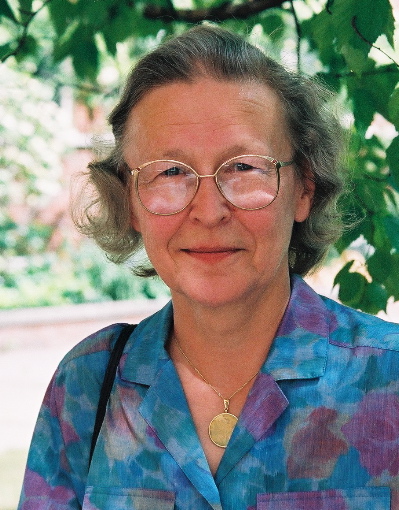
Constance van Eeden with her SSC Gold Medal, Edmonton, June 1992. photo by Peter Macdonald
Constance van Eeden was born on April 6, 1927 in Delft, The Netherlands. Her family moved to Bergen-op-Zoom in 1934; Ms. van Eeden did second through 6th grade there, and then high school, finishing in June 1944. She obtained her Ph.D. in the Faculty of Science at the University of Amsterdam in 1958. Her academic career took her through a succession of academic positions, first in the Netherlands, then in the United States and then Canada. Eventually she returned to the Netherlands where she presently lives. Professor van Eeden is a Fellow of the Institute of Mathematical Statistics and the American Statistical Association, and Elected Member of the International Statistical Institute (ISI). The Statistical Society of Canada awarded her the Gold Medal in 1990. Professor van Eeden is one of the two General Editors of Statistical Theory and Method Abstracts, published by the ISI. She spends one semester each year visiting the Department of Statistics at UBC where she is an Honorary Professor and where, among other things, she works with Jim Zidek.
The following extracts of a dialogue recorded in June, 2003 in Halifax originally appeared in vol. 17, number 4 of Liaison, October 2003.
What memories do you have from your early family years?
My earliest memory has more to do with my two one-and-a-half-year younger brothers. I remember them playing. One died (in 1931) when he was two-and-a half and his twin brother could of course not understand what happened and I could not either, really. My father never got over it. It was bad for my mother too, of course. And for me and my older sister.
Your school years started in the Great Depression and finished during the Second World War. What were your experiences of those times like?
The Depression didn't mean anything to us kids. My father was a high school teacher and they did not get fired. We had, after our move to Bergen-op-Zoom, a big vegetable garden where my mother grew enough fruit and vegetables for the whole year. We had some chickens too. So, we had enough to eat. There was no luxury but there was enough of everything we needed, clothes and food, a place to sleep and a roof. On May 10th, 1940 Germany invaded the Netherlands. I woke up hearing planes. We put up five days fighting and then the Germans fire bombed Rotterdam. A large part of the middle city was gone. There were lots of dead civilians. If we didn't give up the next day, they said they would do the same thing to Amsterdam. We believed them.
What was the occupation like?
I remember that some of my teachers disappeared, to avoid capture. Food got scarce. There was a lack of things like spare parts for bicycles. There was a shortage of soap too. You felt dirty. All your clothes, your house and your dishes had to be washed and there was simply not enough soap for all of that. That was something we didn't think of, before the war. Lifestyles were dramatically changed: There was always fear that what you said might be reported back to the small Dutch Nazi party. People were conscripted to provide labor for German factories. There were many curfews. It was like house arrest. I knew many people who got away, who escaped - through cleverness, or good luck, or the unwillingness of common German soldiers to follow orders. I also knew others, many of them Jews, who were not so lucky.
On D-Day, the 6th of June 1944, you were writing your final high school exams. The liberation finally came in October 1944. What was this like for you?
The day that the Canadians pulled in, I will never forget that. Two o'clock in the morning. All this noise in the street and there they were. But we knew already that the Allies were on their way. We followed them, by illegally listening to the BBC broadcasting from England.

Last year of high school, 1943-44, with the physics-chemistry teacher.
The recovery from the war was slower than people think. The retreating Germans destroyed things that could have been used against them. Rationing and currency restrictions went on well into the 50's.
With the war over, and having finished high school, you started university.
My first degree, which I got in 1949, in Amsterdam, was in mathematics, physics and astronomy. For my second degree I went into the new actuarial program. Statistics and probability programs didn't exist then. While I was taking a course in statistics toward my second degree - this was in 1954 - my teacher told me that the Statistics Department at the Math Research Center in Amsterdam was looking for assistants. I went over there and talked to Jan Hemelrijk who was second in command there and I got hired part-time as an assistant. Essentially I drifted into full-time work there while I continued to progress in my own university studies. Then someone came to me with a consulting problem that led me to drift into a Ph.D. under David van Dantzig. I also had Hemelrijk as (unofficial) co-supervisor. The problem that started my Ph.D. was how to estimate two probabilities when you know one is less than the other. I didn't set out to make a thesis out of that, you know! I just solved the problem using maximum likelihood, and then it turned out that I could generalize it far enough to make a thesis out of it. I got my Ph.D. in 1958 with a cum laude - and got a raise.
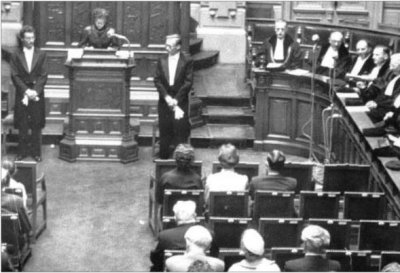
Ph.D. thesis defense, 1958.
Despite my thesis topic, David van Danzig encouraged all of us to use non-parametric methods and to develop new ones. And, people say I'm better known for my work in non-parametrics. If I hadn't had that consulting experience I am not sure that I would be as good a statistician. It's part of knowing what statistics is all about. But I became more and more a mathematician within statistics. Do you want a good description of me? Puzzle solver!
Eventually you went to the United States. How did that happen?
Herman Rubin got me invited to Michigan State. I arrived there in August 1960. Then I got married, to Charles Kraft, in December that year. This led to some employment problems because most Midwestern universities would not allow both members of a couple to have tenure in the same department. So we left Michigan State and moved to Minneapolis where we were in separate departments, but even that proved to be a problem. When Charles suggested to the university that maybe he and I should get a divorce and just live together, so as to solve the problem, they relented. But by that time we were on our way to Montréal and there they had no such concerns.
Did you and your husband influence each other intellectually?
We wrote nearly 10 papers together! Charles was extremely intelligent, extremely inventive, full of ideas, but not always ready to work out the details. A large percentage of these ideas of course turned out to be nothing, but that doesn't matter, right? We did a lot of mathematics together and he taught me a lot of probability theory.
After a time your husband began to suffer from manic depressive mental illness, or bi-polar syndrome as it's now known. How did this affect your work and relationship?
We had 7, 8, 9 years, something like that. There is no fixed point where you can say now that he became manic. Towards the end, it became impossible because he was full of nonsensical ideas. It, his mental illness, didn't really start until after we got to Montréal. Charles died in '85 of a heart attack.
What was teaching like, in Montréal?
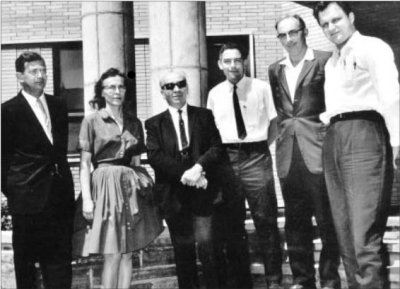
The six speakers at the - Septième session du séminaire du mathématiques supérieures de l'Université de Montréal - 1968. From left: Samuel Karlin, Constance van Eeden, Marc Kac, Peter Huber, Lucien LeCam and Jacques Neveu.
I had the good fortune to encounter the first generation of Francophone Canadians to have the chance to get a university education in science. They wanted to learn like crazy. And they were extremely good. I mean unbelievably good. It was just the time of the whole Francophone emergence in Quebec. Maurice l'Abbé, as far as I know the first Ph.D. in math among Francophone Canadians, got his degree at Princeton. It was not easy for the Francophones in Quebec to get a degree at an English-language institution because not much English was taught in Quebec schools. When Maurice l'Abbé became head of the Department of Mathematics at the Université de Montréal in the early 1950's he brought in many non-Canadian mathematicians. The department became incredibly international and that helped a lot to make it possible for Francophone Quebecers to get a very good education in the mathematical sciences.
In the 1970's and a good part of the 80's, I was probably the main person for Ph.D.s in statistics in Quebec. I had my pick of students. But I could not take all the statistics students who wanted to go for a Ph.D. I missed a very good one. François Perron asked me to be his adviser and I had to tell him no, ply because I could not have more than the five I had. I felt very sorry about this because I knew how good he was.
I had many wonderful students who had great promise, and made real contributions. I have sad memories of many students too; it seems too many of them died prematurely, of cancer, of heart problems, of lupus.
Tell us about your overview of the discipline of statistics. What do you see as the important principles of the subject?
I don't see it as a collection of principles. For instance, if you ask if I am a Bayesian, the answer is no. I can get my estimators from a Bayesian approach or not; it doesn't matter. But, I like to look at properties from a non-Bayesian point of view. I want to know: What's the mean? What's the variance? What's the distribution? And stuff like that. Is it minimax? Or unbiased?
Problem solving is, of course, not what the field is all about. I just love to solve problems and there are so many of them. It's fun. It's just more or less accidental I got into statistics rather than physics or economics. There are lots of people that do have a coherent view of the whole field. I don't.
You have a reputation for intellectual fastidiousness. Is it justified?
Well, before I use a result from a book or paper, I verify the proof. To this day I frequently write to authors insisting that they fix mistakes or retract their claims. You wouldn't believe some of the responses I get.
Among papers published in international refereed journals, what fraction would you guess have some major flaw that can't be fixed readily?
Even when somebody supposes a function to be continuous, when he needs absolutely continuous, I don't find that a serious flaw, because you can fix it by adding one word. But one instance I recently saw was really something! The authors looked at an estimator defined as the solution to a well-defined equation. They proved a theorem about this estimator, but never looked at how many solutions this equation had - if any. And they had four such 'estimators'! I could give you other examples.
What do you think the error rate is? One per cent?
Oh, no it's more than one.
Fifty percent?
Easily ten.
So, you would guess about 10% have serious problems of this sort?
I would say that.
Not minor things, but serious ones?
Forget the minor things. I am still corresponding with the two authors of that paper I just mentioned. It was published. That one I am trying to fix up myself. It is not easy to fix, so I am not sure that their theorems are seriously wrong, but all the proofs are. I have not even finished completely reading it yet.
You have published 65 papers. Have people tried to plagiarize your work?
Four, that I know of.
You endowed the van Eeden Fund at the UBC Statistics Department. What motivated you?
I have more money than I need. I have a good pension, some social security from each of three countries and savings from which I get interest. So, do some good with it. And my daughter always says: "I hope that when you die there is nothing left over".
Tell us about the Festschrift and Symposium in June 2002 in your honour.
Well it was indeed a great honour. It was organized by Marc Moore and Sorana Froda (my first and eleventh Ph.D. students), and by Christian Léger. The Festschrift is now almost finished. It's being published in the IMS Lecture Notes-Monograph Series. It is about five hundred pages, about twenty-eight papers. Many more authors of course. We are waiting for the physical copies.
What is the current state of the field of statistics?
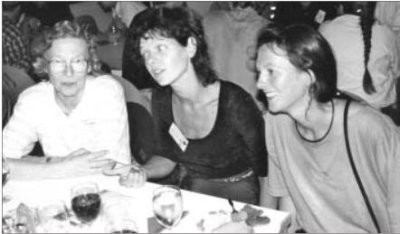
From left: the first (Constance van Eeden, 1958), second (Sara A. van de Geer, 1987) and third (Mathisca C.M. de Gunst, 1988) female Ph.D's in statistics in The Netherlands taken at the 4th World Congress of the Bernoulli Society, Vienna, 1996.
Fewer and fewer people are interested in the fundamentals of the theory. It worries me there are not too many people who prove theorems and these people are necessary! If you don't have such people, for a while it doesn't matter. But you can't keep going that way forever, because at some point there will be not enough theoreticians anymore, and therefore not enough who can educate a new generation.
On the other hand, I don't think statistics could survive if we did not have the input of actual problems. Look, my own problem, the one that started off my research career, came from there. At the Amsterdam Math. Research Centre, I didn't spend all my time consulting. I spent a fraction of my time consulting. I learned a lot from it and it's good that many people do it, but it takes much to prove that your method works 'like it should' and there must be people educated, capable of doing it. At the present time it is on the low side. I am afraid there are not enough of them, percentage-wise.
You stopped doing consulting quite some time ago, is that not the case?
Yes, that's true. My last experiences in consulting, in the 70's, were unsatisfactory even though one led to a publication in The Annals of Statistics.
Have you any comments to make on the academic side of statistics, or on universities in general?
I find universities too commercialized, too much about money instead of what they are meant to be: partially education and partially research. I find it going too much in the direction of 'does this pay?'
The administrators think they have the right to tell us what to do and not to do. It should be the other way around. We hire those people, with the money they supply for us, to do our administration and take the burden of admin-jobs away from us.
Once you told me you thought all the researchers in the world should go on strike to remind people how important the universities are. Do you still feel that way?
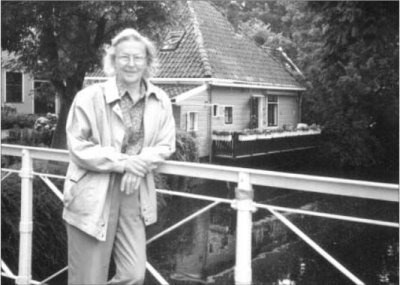
In Broek, Waterland, 1989.
Yes, if I were thirty or forty years younger I would start it, probably. There are many people to whom I say this. They say how are we going to support ourselves? I said that shouldn't be difficult. The best educated, most intelligent people of the world should be able to support themselves if they want. I think we let ourselves be bullied too much by the administrators.
How did it feel to be a woman amongst a whole bunch of men when you were starting out?
I never had any problem with it. Women now seem to feel insecure. I have never felt insecure in any kind of a way. I don't understand women now, I don't understand why they feel they are different or why they have to act differently or why there have to be all these special things for women.
Women argue that they have been historically disadvantaged, an argument perhaps similar to Francophone Quebecers. Do you believe this?
I don't see that. Women in general have, not always, but surely for a very long time now, had the same chance as men to get an education if they wanted it. But Francophone Quebecers ave not. Nobody put any obstacles in my way while I was getting educated. On the other hand, when I got to this continent, I found out about getting tenure and stuff like that as a woman. Michigan State refused me tenure because I was a woman. When we moved from Michigan State to Minneapolis, the Dean looked at the two CV's and I had more publications than my husband. Then he is supposed to have said to the department head, if one of those two is supposed to get tenure it has to be her. But the department head could not accept that. So, Charles got the tenure, I did not. But this, of course, was some 40 years ago.
I had two parents who just were absolutely convinced that we all had the right to the same chance in life. On the other hand, after I got my Ph.D. in 1958 it took 29 years until the next Dutch woman got a Ph.D. in statistics. I asked a Dutch colleague once (in 1984, or so), why this was. Don't you encourage the ones that show promise? I asked. He said: `Well, if they want a Ph.D. they can come to me.' And then three or four years later two Dutch women got Ph.D.-s in statistics.
It was really maybe a matter of discouragement from parents and from teachers. The ways were open, but the women students were discouraged either at home or at school. And also there was a lack of role models.
Are you still working on your manuscript on estimation in restricted parameter spaces?
I am still working on it but people are still publishing in the field. So, I find a new paper, because when I am doing my abstracting I see everything in the whole world. Then it is much more interesting to start reading that paper and see if I can do something with it. But my manuscript will be finished sometime!
Which problem do you most wish you could solve?
Give me a way to find, in non-restricted parameter spaces, minimax estimators. Restricted is more difficult still, but even in non-restricted environments there is no answer. You just have to stumble on estimators.
One final question: If someone were going to give you a gold medal today, for what achievement would you like it to be?
Helping to put Francophone Quebec on the map of statistics. Sorana Froda said about me: She has them (former Ph.D. students) from coast to coast. From Louise Dionne in Newfoundland to Jean Meloche in Vancouver. There is one in France, and one in Morocco too.
The Festschrift referred to in the interview will be published as follows:
Mathematical Statistics and Applications: Festschrift for Constance van Eeden
. IMS Lecture Notes and Monograph Series, 43, 2003. Editors: Marc Moore, Sorana Froda and Christian Léger. Published jointly by CRM (Centre de recherches mathématiques), Université de Montréal and IMS (Institute of Mathematical Statistics).
About the Interviewer
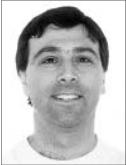
Bertrand Clarke